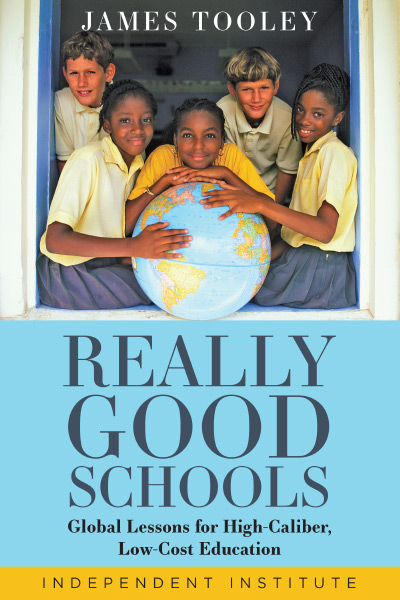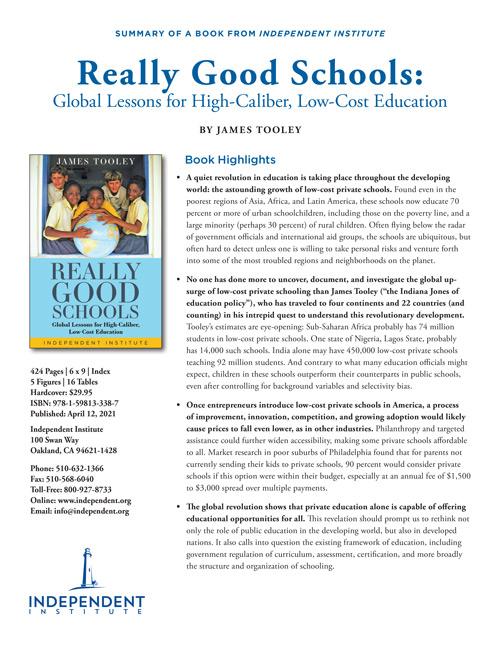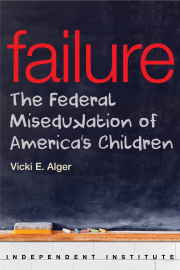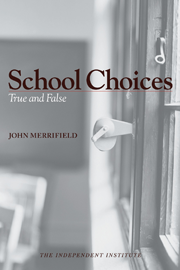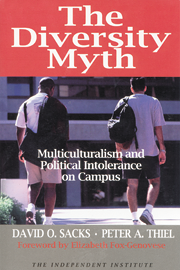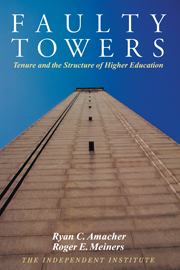| List Price: | ||
| Price: | $14.98 | |
| Discount: | $14.97 (Save 50%) |
| Formats |
Hardcover |
eBook |
| List Price: | ||
| Price: | $14.98 | |
| Discount: | $14.97 (Save 50%) |
| Formats |
Hardcover |
eBook |
Overview
Almost overnight a virus has brought into question America’s nearly 200-year-old government-run K-12 school-system—and prompted an urgent search for alternatives. But where should we turn to find them?
Enter James Tooley’s Really Good Schools.
A distinguished scholar of education and the world’s foremost expert on private, low-cost innovative education, Tooley takes readers to some of the world’s most impoverished communities located in some of the world’s most dangerous places—including India and such war-torn countries as Sierra Leone, Liberia, and South Sudan. There, in places where education “experts” fear to tread, Tooley finds thriving private schools that government, multinational NGOs, and even international charity officials deny exist.
Why? Because the very existence of low-cost, high-quality private schools shatters the prevailing myth in the U.S., U.K., and western Europe that, absent government, affordable, high-quality schools for the poor could not exist.
But they do. And they are ubiquitous and in high demand. Founded by unheralded, local educational entrepreneurs, these schools are proving that self-organized education is not just possible but flourishing—often enrolling far more students than “free” government schools do at prices within reach of even the most impoverished families.
In the course of his analysis Tooley asks the key questions:
- What proportion of poor children is served?
- How good are the private schools?
- What are the business models for these schools?
- And can they be replicated and improved?
The evidence is in. In poor urban and rural areas around the world, children in low-cost private schools outperform those in government schools. And the schools do so for a fraction of the per-pupil cost.
Ubiquity, affordability, quality, value for money, equity, choice, and sustainability—these are the seven categories by which schooling should be judged, according to Tooley. In every instance, one is forced to conclude that low-cost, non-governmental, entrepreneurial education, as practiced by the poor around the globe, contains the key to their rise to prosperity and leadership positions within their own respective cultures. Alarmed by recent government barriers in education, Americans can now find hope in the triumph—in the face of acute adversity—of these remarkable schools.
Because of the pandemic, parents in America and Europe are discovering that the education of their children is indeed possible—and likely far better—without government meddling with rigid seat-time mandates, outdated school calendars, absurd age-driven grade levels, and worse testing regimes. And having experienced the first-fruits of educational freedom, parents will be increasingly open to the possibilities of ever greater educational entrepreneurship and innovation. Thankfully, they have Really Good Schools to show the way.
Contents
Introduction
Part 1: A Global Revolution
- Ubiquity and Affordability
- Quality and Value for Money
- Equity and Choice
- Sustainability and the Rise of Educational Entrepreneurs
- Education and Domination
Part 2: Reclaiming the Framework of Education
- Great Expectations
- The Unbearable Burden of Learning
- Five Problems in Search of a Solution
- A Thought Experiment in Educational Freedom
- A New Measure of Education
Part 3: Off to America
- Some Problems with American Education
- The Theory and Practice of School Vouchers
- Why Milton Friedman Changed His Mind
- Two Types of School Choice
- Education as Spontaneous Order
List of Tables
List of Figures
Notes
Bibliography
Index
About the Author
Detailed Summary
- A quiet revolution in education is taking place throughout the developing world: the astounding growth of low-cost private schools. Found even in the poorest regions of Asia, Africa, and Latin America, these schools now educate 70 percent or more of urban schoolchildren, including those on the poverty line, and a large minority (perhaps 30 percent) of rural children. Often flying below the radar of government officials and international aid groups, the schools are ubiquitous, but often hard to detect unless one is willing to take personal risks and venture forth into some of the most troubled regions and neighborhoods on the planet.
- No one has done more to uncover, document, and investigate the global up-surge of low-cost private schooling than James Tooley (“the Indiana Jones of education policy”), who has traveled to four continents and 22 countries (and counting) in his intrepid quest to understand this revolutionary development. Tooley’s estimates are eye-opening: Sub-Saharan Africa probably has 74 million students in low-cost private schools. One state of Nigeria, Lagos State, probably has 14,000 such schools. India alone may have 450,000 low-cost private schools teaching 92 million students. And contrary to what many education officials might expect, children in these schools outperform their counterparts in public schools, even after controlling for background variables and selectivity bias.
- Once entrepreneurs introduce low-cost private schools in America, a process of improvement, innovation, competition, and growing adoption would likely cause prices to fall even lower, as in other industries. Philanthropy and targeted assistance could further widen accessibility, making some private schools affordable to all. Market research in poor suburbs of Philadelphia found that for parents not currently sending their kids to private schools, 90 percent would consider private schools if this option were within their budget, especially at an annual fee of $1,500 to $3,000 spread over multiple payments.
- The global revolution shows that private education alone is capable of offering educational opportunities for all. This revelation should prompt us to rethink not only the role of public education in the developing world, but also in developed nations. It also calls into question the existing framework of education, including government regulation of curriculum, assessment, certification, and more broadly the structure and organization of schooling.
A specter is haunting the developing world—the specter of low-cost, privately owned schools.
Spreading into every corner of sub-Saharan Africa, Asia, and Latin America, this grassroots revolution is bringing education to communities ill served by traditional government-run, government-financed schools.
And while it has fierce critics—an alliance of academics, international aid agencies, and teachers’ unions—this movement is by all measures a success. Low-cost private schools are ubiquitous, truly affordable, and high quality. They are fair to girls and other disadvantaged groups. And they are the clear, well-informed preference of the parents who choose them over the standard government model.
The leading field researcher and explainer of this global revolution, James Tooley, first revealed it to book audiences in his 2009 exposé, The Beautiful Tree: A Personal Journey into How the World’s Poorest People Are Educating Themselves—a work that earned him the Sir Antony Fisher International Memorial Award and the moniker, “the Indiana Jones of education policy” (Andrew Coulson, author of Market Education: The Unknown History). In the ensuing years, Tooley continued his globe-trotting research, exploring low-cost private schools in a total of 22 countries (so far) on four continents.
In his latest book, Really Good Schools: Global Lessons for High-Caliber, Low-Cost Education, Tooley offers updated observations on the phenomenon of low-cost private schools and goes two steps further, challenging the standard framework of education (for curriculum and assessment, compulsory attendance, and even the institution of public schooling) as well as showing what it would take for the United States (a leader in so many fields, but a laggard in educational delivery and achievement) to enjoy a renaissance in K-12 education.
American public school reform, school vouchers, and charter schools, Tooley notes, have been hamstrung by organized interests and bureaucratic fumbling. And even where successful they get us nowhere beyond the “supplicant model,” wherein parents must ask (or beg) policymakers for a moderately greater degree of educational independence (although usually for naught). The most promising way forward, therefore, is to push for full educational independence by encouraging entrepreneurs to emulate their counterparts in the developing world and introduce their own models of low-cost private schools. That path, Tooley explains, is surprisingly open, with many states offering few regulatory hurdles and several large cities offering additional characteristics that make them especially ripe for the first cohort of what could easily become a large wave of low-cost private schools.
Enlightening, inspiring, and programmatic, Really Good Schools not only shows what’s happening in affordable private education around the world and why. It also shows that students’ academic success and life prospects need not be held hostage to bureaucratic inertia, vested interests, and chronic underperformance. Educational independence is already giving millions of the world’s poorest families new opportunities for social and economic advancement. Now it’s time for the entrepreneurs to apply these lessons throughout North America, the United Kingdom, and the rest of the developed world.
A Global Revolution
Really Good Schools is divided into three sections, with part 1 cataloguing our current state of knowledge about this phenomenon. When Tooley first plowed this ground in the early 2000s, he was virtually alone in researching the topic. Although hundreds of researchers, activists, philanthropists, entrepreneurs and investors have since become active in the field,Tooleyhasboth synthesized their findings and conducted original research. A key discovery of his analysis is that the low-cost private schooling model scores high on seven key metrics essential for any development program: scalability/ubiquity, affordability, quality, value for money, equity, choice, and sustainability.
Tooley’s research offers seven lessons of education entrepreneurship:
- Chains of low-cost private schools offer efficiencies absent from standalone schools. A few chains discussed in Really Good Schools are BRAC (Bangladesh), PEAS (Uganda), Omega (Ghana), and Bridge International Academies.
- Costs must be kept low from the parents’ perspective. Morale must be kept high to maintain parental satisfaction and minimize staff turnover.
- Scripted lessons plans are a powerful tool for ensuring consistent quality and cost-effective teaching.
- Many cash-strapped families can’t save up money to pay fees in one or two large chunks but can manage to pay in small increments. Omega Schools has experimented with both an installment plan and a “pay as you learn” daily payment plan.
- Teaching must accommodate students who learn at different paces. This can be facilitated via adaptive-learning technology (as some chains have employed) or peer learning.
- While a for-profit business model must be financially sustainable, philanthropies can play a role by providing targeted scholarships for the poorest of the poor or in covering overhead expenses.
- Leasing classroom space often makes more sense than buying or building them.
Tooley also finds that public corruption and political oppression are often reasons why parents from Liberia to India have lost trust in state power over education. Corruption and oppression may abate if reductions in public spending accompany the growth of low-cost private schooling.
Reclaiming the Framework of Education
While part 1 is firmly rooted in evidence, part 2 is more speculative, raising questions about what might be achieved if the framework of education were no longer under government control. It begins by examining two sets of criticisms that could be used against low-cost private education, arguments put forth in the widely acclaimed books, Poor Economics, by Abhijit Banerjee and Esther Duflo, and The Case against Education, by Bryan Caplan. On close inspection, the difficulties they raise result from government intervention and apply to public education.
One common complaint about traditional schooling is its dreariness: too often students find it boring rather than engaging. Tooley discusses remedies proposed by educators as diverse as Sir Ken Robinson; Salman Kahn, creator of YouTube’s Kahn Academy; the legendary Maria Montessori; Rudolf Steiner, who inspired more than 1,000 private Waldorf schools in around 60 countries; and A. S. Neill, creator of famed Summerhill school in Suffolk, England.
The “unbearable burden of learning,” as Tooley calls it, is a symptom of rigid, over-regulated schooling that emerges from the government’s framework of education. Five other problems arising from government control also stand out, perhaps especially for public schools in the developing world:
- National exams, which are too infrequent for course-correction;
- School dropouts who don’t complete their exams;
- Exams and curricula that are more about “signaling” than for developing skills and human capital;
- Age-based classrooms that ignore students’ developmental differences;
- Curriculum content that ignores students’ interests and motivations.
These problems are not inherent in education per se. Instruction in music and martial arts have structure, standards, and testing, yet they manage to keep many students highly engaged. Other examples of non-government frameworks of education discussed are India’s NIIT technology training certification (reviled by government but respected in industry) and the highly esteemed International Baccalaureate program. Tooley offers further thoughts on student engagement and testing, including lessons from the global PISA exams. What becomes clear is that a rich variety of institutions and indicators of academic excellence could emerge if governments didn’t interfere so much with the framework of education.
Off to America
In Part 3, Tooley looks at the current state of American education, and how we can best improve it. Paradoxically, it’s often the self-professed “realists”—who doubt that American education can be measurably improved upon—who underestimate its problems. (They also seem to think that the only way forward must include a teacher lecturing a few days a week in front of a classroom.) Tooley grapples at length with the educational writings of Charles Murray, who is both a very thoughtful critic of current educational policies and highly doubtful that most students could be more academically successful.
Next, Tooley examines the transformational potential of school vouchers and charter schools, along with associated proposals such as tax-credit scholarships and education savings accounts. Although more than 60 years have elapsed since the publication of Milton Friedman’s definitive statement in favor of vouchers, the percentage of American school children in such programs is in the very low single digits. However justified they appear in theory, vouchers in practice have been easily blocked by vested interests. Charter schools face a similar problem: supply has not kept up with demand because of huge bureaucratic and political impediments. A more ambitious vision for an American educational renaissance—in which low-cost private schools play a key role—may prove to be far more practical.
Friedman himself became skeptical that vouchers were sufficient to fully transform education. The exhaustively researched Newcastle Commission Report of 1861, he learned, had found that all but a tiny percentage of children in England and Wales attended school for around 6 years—despite only small government subsidies to some schools and well before schooling was compulsory. Such findings were confirmed and expanded upon in the mid twentieth century by the economist E. G. West, who found that educational quality was maintained in the for-profit private schools that were outside of government control of the curriculum. West also demonstrated a similar story occurred in New York State, where schooling was nearly universal before 1821 (well before it became compulsory) and with only small state subsidies.
Given the examples from the nineteenth century and the developing world today, could low-cost, high-quality private education serve American families of modest means? Undoubtedly. In the United States, a private-school business model that strives to keep costs very affordable could become financially sustainable even with tuition as low as $3,000 per year—about $58 per week. At this price, even families just above the federal poverty level, with average annual discretionary income of $6,040, could afford to enroll one child and possibly two children, assuming that all discretionary income were spent on school fees. This $3,000 estimate contrasts with current average private-school fees at the elementary level of $9,263 per year.
Where in the United States are low-cost private schools most likely to take off first? When regulatory flexibility is combined with key housing, demographic, and educaonal indicators, six large cities look like especially good matches for low-cost private schools: Jacksonville, Fla.; Charlotte, N.C.; Louisville, Ky.; Milwaukee, Wisc.; Atlanta, Ga.; and St. Louis, Mo. Judging only by a state’s regulatory climate (i.e., teacher certification requirements and curriculum flexibility), states in the most-attractive category include Texas, Iowa, Alabama, and Pennsylvania, while states with the least regulatory flexibility include Arkansas, Virginia, the Carolinas, Florida, and Massachusetts.
Tooley has made a compelling case for the low-cost private school revolution. Now it’s time for entrepreneurs to advance the cause in the developed world. Educational independence—and the benefits it brings to students and society—will be greater to the extent that we unshackle the framework of education from government control and let schooling be driven by the visions of innovators and the concern of parents for the well-being of their children.
Praise
“Ten years after his pioneering book The Beautiful Tree, James Tooley has taken his argument about the transformative power of low-cost private education to a new and revelatory level in Really Good Schools. The deeply researched first part of this volume makes the compelling argument that decentralized, self-organized teaching and learning offer the best hope for children in the poorest parts of the world, from Kenya to Ghana, from Liberia to Nigeria, from Gujarat to Gansu. But Tooley wants us to understand that we in the developed world—with our sclerotic systems of public education, our over-priced private schools for the wealthy, and our insufficient schemes for reform—also have much to learn from the spontaneous order of the countless slum schools he has visited. This is a bold and inspiring manifesto for a global revolution in education.”
—Niall C. Ferguson, Milbank Family Senior Fellow, Hoover Institution, Stanford University
“In the fascinating and provocative book, Really Good Schools, James Tooley applies his immense learning about low-cost, entirely-private schools around the world to develop a daring and truly thought-provoking proposal along those lines for the United States. En route, he engages in lively virtual arguments with both Charles Murray and Milton Friedman! Check it out.”
—Chester E. Finn, Jr., Distinguished Senior Fellow and President Emeritus, Thomas B. Fordham Institute; Senior Fellow, Hoover Institution; former U.S. Assistant Secretary of Education
“Based on James Tooley’s extensive knowledge of educational systems in developing countries from around the world, his pathbreaking and superbly written book Really Good Schools provides the essential understanding of how low-cost, private schools extend access to high quality education for the poor. Reading this book will allow educators and parents, academics and students, school reformers, policymakers, and the general public, at last to have the proven and authoritative know-how to allow children to transition from failing government school systems in the U.S., U.K., and elsewhere, into inexpensive, first-rate schools. This makes Really Good Schools utterly essential reading!”
—Sir Anthony F. Seldon, former Vice Chancellor, Buckingham University; Co-Founder and first Director, Institute for Contemporary British History; President, International Positive Education Network
“Based on remarkable and fascinating, personal, worldwide experience and meticulous research—both conveyed with engrossing detail—James Tooley’s book Really Good Schools reveals the surprising successes of low-cost private schools pioneered by conscientious entrepreneurs (including himself) in the slums of developing countries where resources are frequently scarce, and danger often lurks. Careful to acknowledge and respond to critics, Tooley makes the case for the comparative advantage of low-cost private schools that merits respect and serious attention. Really Good Schools has relevance to both those interested in international development as well as to readers in advanced nations that are experiencing educational ferment given the social and economic problems of contemporary times, including the threat to educational attainment posed by the coronavirus pandemic.”
—Donald A. Downs, Alexander Meiklejohn Emeritus Professor of Political Science, Law and Journalism, the Glenn B. and Cleone Orr Hawkins Emeritus Professor of Political Science, and Co-Founder of the Center for the Study of Liberal Democracy at the University of Wisconsin, Madison
“Here in Really Good Schools is perhaps the most beautiful and neglected story in the world. Unremarked and unreported, low-cost private schools have sprung up to serve some of the poorest places on Earth. For 20 years, Professor Tooley has been seeking to bring this heartening development to wider notice. He has travelled the shantytowns of Africa and India. He has found ultra-cheap independent schools even in China. Again, and again, he has heard how slum-dwellers make sacrifices to avoid the listless and perfunctory education offered in government schools. Here, in his most complete analysis of the phenomenon, he examines why it continues to expand, despite the disdain of Western aid agencies and the outright hostility of local authorities. And he ponders how some of the principles of self-organized learning might be imported into the United States and other wealthy nations. I guarantee that, after reading Really Good Schools, you will feel more cheerful.”
—Lord Hannan (Daniel J. Hannan), former Member, European Parliament; bestselling author and columnist, Sunday Telegraph and Washington Examiner
“In Really Good Schools, James Tooley presents a compelling argument for education in contradistinction to schooling, a difference seemingly lost in the bureaucracies of public education. He identifies the possibilities and promise of private education as a ground-up spontaneously ordered enterprise that can serve even the lowest income individuals more effectively than can the Administrative State.”
—John W. Sommer, Knight Distinguished Professor Emeritus, University of North Carolina at Charlotte; former Dean, School of Social Science, University of Texas at Dallas
“In Really Good Schools, James Tooley takes us on an adventure across some of the most difficult parts of sub-Saharan Africa and South Asia, revealing the extraordinary revolution of low-cost private schools taking place. But he also takes us on a journey back to the West, to Britain and America, to show the relevance of his findings for education there too. Really Good Schools is a manifesto for educational freedom—the emancipation of education, as he calls it—and how we can move towards it.”
—Lord Lingfield (Sir Robert G. W. Balchin), Chairman, Commission on Special Needs in Education; former Pro-Chancellor, Brunel University; Founder Chairman, League of Mercy; Chairman, Centre for Education Management; former Director-General, St. John Ambulance; author, Choosing a State School: How to Find the Best Education for Your Child
“I strongly support the idea of expanding the affordable independent sector: variety in education is the spice of life especially in this drearily conformist age. So, more ammunition to James Tooley and from his book Really Good Schools.”
—Lord Robert J. A. Skidelsky, Emeritus Professor of Political Economy; University of Warwick
“In Really Good Schools: Global Lessons for High-Caliber, Low-Cost Education, James Tooley advocates that American entrepreneurs could be key in breaking down government control over our education system. He proposes low-cost, private schools as the means for bringing about educational freedom. . . . Tooley makes a crucial point about education reform: ‘The revolution in education is not ‘to fix’ the current public system, ‘but to change it; not to reform it but to transform it.’ The ‘great irony’ is that ‘we actually know what works. We just don’t do it on a wide enough scale.’’ . . . Providing educational freedom is the key to transforming K-12 education in America. Educational entrepreneurs must step forward to become the first adaptors of low-cost private schools. Once the initial pioneers begin to showcase their transformational success, others will quickly follow. Competition will lead to higher quality, and as the supply increases, prices will be kept low. The beneficiaries will be America’s children and families, and ultimately the wellbeing of the nation.”
—RealClearEducation
“The author of The Beautiful Tree has done it again. His truly unique and exceptional book Really Good Schools is another must-read about how some of the most disadvantaged people on earth are taking matters into their own hands to provide great, low-cost educations for their children. But, Tooley goes much further in Really Good Schools and provides a new clarion call for those who believe in the power of education to empower individuals to live their best lives—a call for education-choice supporters to recognize and embrace the notion of ‘self-organized learning environments’ in order to reclaim the education of youth from those who prize uniformity and government control over schooling.”
—Benjamin Scafidi, Professor of Economics and Director, Education Economics Center, Kennesaw State University
“Dr. James Tooley has uniquely challenged all of us with his revelations on low-cost private schools. Really Good Schoolsis atrailblazer for a grassroots transformation of education and illuminates the rewards that follow a system that is left in the hands of those closest to children. Tooley takes us with him in his journey, exploring the privatizing of education across the world, and through his clever insights, leads us into a new world that will change the course of education for generations to come.”
—Jeanne R. Allen, Founder and Chief Executive Officer, Center for Education Reform
“Well-read, well-travelled, and thoughtful James Tooley has created compelling starting points for a lot of critical conversations. Tooley imagines that his, ‘task is simply to write it all up, in the hope of inspiring and motivating others to get involved.’ In Really Good Schools, he has written it all up, and it is inspiring, but he is far too modest. He has discovered and directly demonstrated that freedom and entrepreneurship can produce excellent, low-cost schools that very few others thought possible, even when they have already existed, against long odds, right under their noses.”
—John D. Merrifield, Professor of Economics Emeritus, University of Texas at San Antonio
“In Really Good Schools, Tooley reminds us through vivid examples from across the globe that we don’t have to turn to government for education; that even in the poorest and most remote areas, it is private schools, not public schools, serving the needs of families. And when so many continue to insist that ‘accountability’ comes from government oversight, Tooley shows yet again how market-based education creates the ultimate form of accountability by making schools responsive to the needs of parents. His book on the promise of low-cost private education comes at a pivotal moment: the COVID-19 pandemic has shuttered public schools and led many families to turn to private options. At a time when the pandemic has given us the opportunity to rethink the structure of education, Really Good Schools provides a must-read guide.”
—Lindsey Burke, Director, Center for Education Policy, Institute for Family, Community and Opportunity, Heritage Foundation
“Really Good Schools picks up on James Tooley’s previous revelations about the wondrous and (at the time) unknown existence of low-cost private schools and sketches a future built on them. This underlying structure of a radically different education system breaks out of Mumbai and heads for America. It not only builds a case for a new future but artfully dissects the arguments of those still holding hope for making today’s schools better. Warning: this is not a book to be skimmed but one to be intellectually grappled with.”
—Eric A. Hanushek, Paul and Jean Hanna Senior Fellow, Hoover Institution
“James Tooley is an invaluable authority on private schooling. In Really Good Schools, his advice on the provision of accessible, affordable school choice options has never been more timely or necessary.”
—Frederick M. Hess, Resident Scholar and Director of Education Policy Studies, American Enterprise Institute
“Really Good Schools provides an interesting review of educational entrepreneurship around the world.”
—Kent Grusendorf, Senior Fellow and Director, Center for Education Freedom, Texas Public Policy Foundation; former Member, Texas House of Representatives and Texas Board of Education; former Chairman, Texas House Public Education Committee
“There is no one who matches James Tooley when it comes to giving a global perspective on the widespread availability of well-performing and low-cost private schools serving children from Africa to India. Importantly, his research gives him the unique ability to analyze why similar low-cost private education is not plentiful in the U.S. and to challenge American education reformers to rethink some of their basic assumptions. Tooley does not merely challenge, however, as he also gives hope for U.S. parents by laying out a business model for low-cost private schools in America. Really Good Schoolsis a must read for all those interested in expanding and improving the education options for children.”
—Lance T. Izumi, former President, Board of Governors, California Community Colleges
“James Tooley, rightly celebrated for his discovery and promotion of private schools serving the poor in Africa, India, and China, now in Really Good School argues that the logic of his findings could transform education in America and Britain. Tooley would abolish government’s role, even in the form of support for vouchers and charter schools, allowing a ‘spontaneous order’ of education to emerge through the decisions of entrepreneurs and parents. A stimulating reading for a time when, as he points out, COVID-19 has brought much of formal schooling to a standstill and invites its reinvention.”
—Charles L. Glenn, Professor Emeritus, Educational Leadership and Policy Studies, Boston University
“In the midst of a pandemic, many parents in developed countries have become keenly aware of the inability of government-operated schools to educate their children. In response, these parents are struggling to form affordable and effective micro-schools. The wonderfully readable book by James Tooley, Really Good Schools, has arrived at exactly the right time to offer models and lessons from how parents in developing countries have managed to succeed in educating their own children without state assistance.”
—Jay P. Greene, Distinguished Professor and Chair of the Department of Education Reform, University of Arkansas
“Really Good Schools is a valuable follow up to James Tooley’s remarkable 2009 book, A Beautiful Tree, which showed us that in some of the world’s poorest slums, with dreadful public schools, a large share of students were enrolled in small private schools started by local entrepreneurs. In this innovative book, Dr. Tooley updates the reader with more case studies and research on this bottom-up educational phenomenon and suggests potential lessons for the U.S. Really Good Schools makes an important contribution to policy discussions regarding school choice and education reform.”
—Michael J. Podgursky, Chancellor’s Professor of Economics, University of Missouri-Columbia
“James Tooley’s work documents the ubiquity of low-cost private schools in the poorest countries and poorest villages of the world. It is hard to read this book and do nothing. Really Good Schools illustrates both the deep-seeded desire for education that exists among humans regardless of income and the many efforts by private individuals to help the poor who otherwise would not be educated.”
—Eugenia F. Toma, Wendell H. Ford Professor of Public Policy and University Research Professor, Martin School of Public Policy & Administration, University of Kentucky
“James Tooley has done it again. With Really Good Schools: Global Lessons for High-Caliber, Low-Cost Education, he has produced another excellent volume on how the power of markets and choice can help drive high-quality school options for poor families. The global revolution of low-cost private education that he profiles shows us how school-reform entrepreneurs across the world are achieving genuine equity. Really Good Schools is a must read for citizens, school leaders, and policymakers alike who want to embrace a larger vision of how to make equality of educational opportunity real for the kids who need it most.”
—Jamie Gass, Director, Center for School Reform, Pioneer Institute
“In the well-trodden field of education studies, it is rare enough for a researcher to supplement the public’s understanding of a well-known issue. But in an earlier book, James Tooley revealed a massive, striking, largely unknown phenomenon: the existence of ultra-low cost, high-quality private schools in developing countries. Now in Really Good Schools, Tooley expands his descriptive and empirical research to other developing and war-torn countries, while offering a thoroughgoing reflection on the significance of this still under-studied reality. Interesting enough on its own terms, Tooley’s book has acquired an unexpected aspect in the wake of COVID-19—might we see the rise of such schools within developed countries like the United States? Tooley argues, persuasively, that it’s possible. For it to happen, would-be entrepreneurs, policymakers, and parents would be well-advised to learn the lessons that Tooley teaches.”
—Max C. Eden, Senior Fellow, Manhattan Institute
“Really Good Schools builds on prior research by introducing new entrepreneurial leaders who teach the children of the poor at a very low cost. Tooley’s tales are of interest at a time when affluent parents in rich countries are forming their own ‘learning pods’ to replace the suddenly closed public schools during the coronavirus pandemic. . . . he offers up nuggets of gem-like quality. . . . Tooley’s warm stories of entrepreneurial accomplishments and cutting critiques of other research both appear in the early chapters that comprise Part I. . . . Part II offers a . . . critique of government-operated schools, with a focus on the wayward policies of Tooley’s home country. In Part III he takes on education reform across the pond. Tooley does not like charter schools, nor does he think much of vouchers. . . . Tooley says choice interventions in the United States fall short of the libertarian economist E. G. West’s vision of totally privatized schooling. For Tooley, the pandemic cannot last too long if it drives everyone to pod learning—even if the teachers managing the pods are poorly paid. No one can accuse Tooley of iterating conventional wisdom.”
—Education Next
“James Tooley, in his book, Really Good Schools: Global Lessons for High-Caliber, Low-Cost Education, shares his remarkable journey of discovering, studying, and starting low-cost private schools serving poor and low-income families in developing nations. A product of grassroots movement rather than central organization or control, these low-cost private schools in countries marked by extreme poverty for a high percentage of their population are a part of a global movement—largely unheard of by those in the developed world. Particularly surprising is that parents living in poverty are opting to send their children to tuition-charging private schools when free, government-provided schools are available. . . . parental satisfaction with private schools in developing nations is significantly higher than in government-run public schools. . . . What can we learn from these developing world private schools? Can their experience be replicated in the U.S.? While the economic landscapes differ, the undergirding principles are universal—private education provides competition to government public schools and promotes accountability. Both of these ingredients are foundational to providing quality education. Private schools are accountable to parents for providing quality academic results, or they will cease to exist. The education monopoly in American K-12 public education, on the other hand, results in the perpetuation of a dismal status quo, which fails to effectively educate over 70% of its students. America would be wise to learn from developing nations and aggressively increase private education—making it available to low-income families and those in poverty, not just to the upper-middle class, wealthy, and elite. It starts with putting more education dollars where they belong—in the hands of parents, who can best decide where their kids should be educated. The resulting boom in educational entrepreneurship would put the U.S. as a leader in K-12 education.”
—RealClearEducation
Author
James Tooley is Vice Chancellor (President) of the University of Buckingham in England, where he also serves as Professor of Educational Entrepreneurship and Policy, and is a Senior Fellow at the Independent Institute. He was formerly Director of the E. G. West Centre and Professor of Education Policy at Newcastle University upon Tyre, and temporarily Global Head of Low Cost Schools for GEMS Education. He received his Ph.D. in education from the University of London, and he has previously taught and researched at the Universities of Oxford and Manchester, Simon Fraser University, and University of the Western Cape, South Africa.
Awards
2021 Next Generation Indie Book Awards
- Finalist in Current Events
- Finalist in Social Justice
2021 Independent Publisher Book Awards (“IPPY” Awards)
- Gold Medal Winner in Education Commentary/Theory
2021 American Book Fest “Best Book” Awards
- Winner in Nonfiction: General
- Finalist in Education/Academic
2021 International Book Awards (American Book Fest)
- Winner in Education/Academic
- Finalist in Nonfiction: General
- Finalist in Social Change
15th Annual National Indie Excellence Awards
- Winner in Education
- Winner in Social/Political Change
- Finalist in Business: General
- Finalist in Current Events
- Finalist for Education
Amazon.com
- #1 New Release in Business Entrepreneurship


